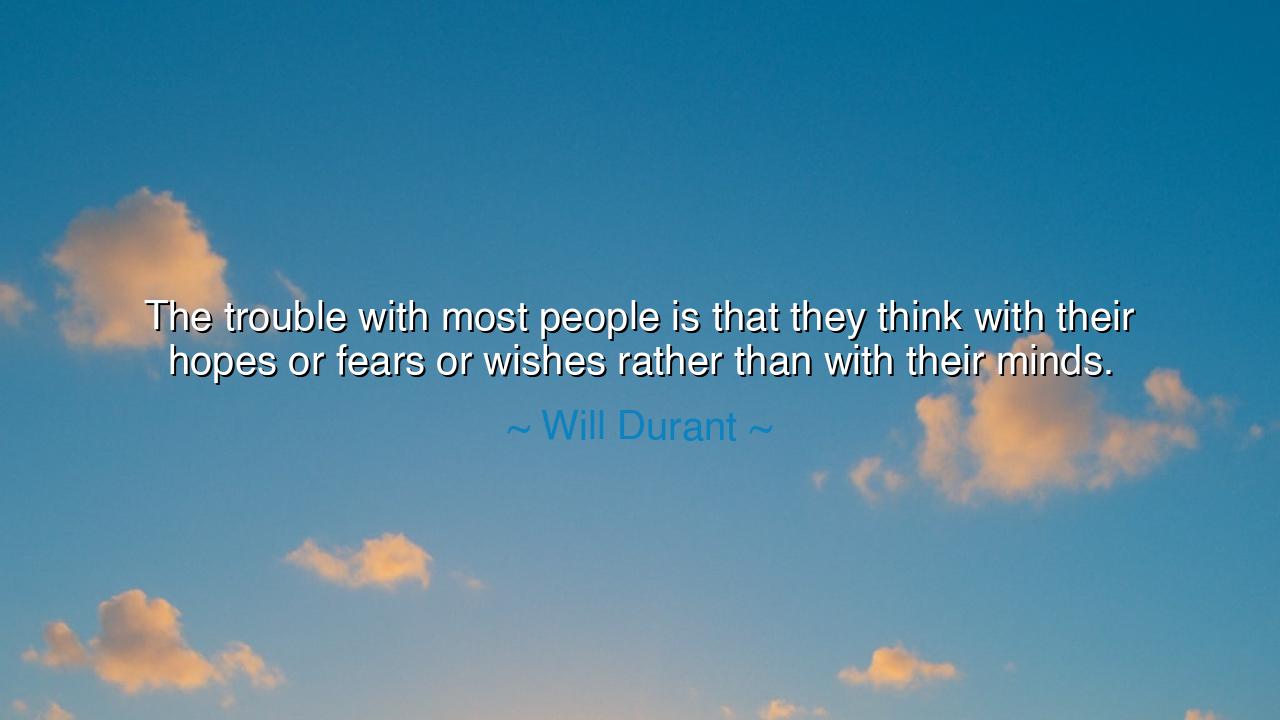
The trouble with most people is that they think with their hopes
The trouble with most people is that they think with their hopes or fears or wishes rather than with their minds.






In the solemn and piercing words of Will Durant, philosopher of civilization and chronicler of humanity’s long struggle toward wisdom, we find a truth that cuts to the very marrow of the human condition: “The trouble with most people is that they think with their hopes or fears or wishes rather than with their minds.” Here speaks not merely a scholar, but a seer who has watched centuries of thought and folly unfold in the grand theater of history. Durant, whose pen traced the rise and fall of empires, understood that the greatest battles of humankind are not fought on fields of war but in the chambers of the mind — where reason and emotion wage their eternal conflict. His words are both lament and lesson, a call to awaken from the dreamlike haze of desire and dread and to think clearly, courageously, and truthfully.
To think with one’s hopes is to see the world not as it is, but as one wishes it to be. It is a comforting illusion, a silken veil woven by longing. Hope, though noble in spirit, becomes dangerous when it blinds the eyes to reality. To think with one’s fears is the opposite — a shadowed vision that shrinks the world to the measure of one’s anxieties, turning every unknown into a threat. And to think with one’s wishes is to confuse imagination with truth, to mistake the echo of desire for the voice of wisdom. Durant reminds us that the true mind — the disciplined intellect — must rise above this storm of passions, perceiving the world not through the fog of feeling, but with clarity as sharp as a blade.
The origin of Durant’s insight lies in his lifelong study of philosophy and history. Having devoted decades to writing The Story of Civilization with his wife, Ariel, he observed the cycles of progress and decay that repeat across ages. Kingdoms rose on the wings of vision, yet crumbled beneath the weight of illusion. Ideologies were born from noble hopes, but perished in fanaticism when their followers ceased to question. Durant saw that civilizations, like individuals, perish not from weakness of will but from failure of thought — from believing what they wish were true rather than what is true. Thus, his warning is not only personal but civilizational: that reason, once dethroned by emotion, leaves humanity vulnerable to chaos.
History itself bears witness to the peril of thinking with hopes or fears. Consider the fall of Troy, that legendary city whose rulers believed themselves invincible. When the Greeks left behind the wooden horse, the Trojans, thinking with hope rather than caution, welcomed it as a sign of victory. Their desire for peace blinded them to deceit — and by nightfall, their city burned. Likewise, in our own age, nations have plunged into wars fueled by fear, and economies have collapsed under the weight of wishful thinking. The lesson repeats through time: those who let emotion rule the mind are like sailors who throw away their compass, trusting the waves to carry them home.
Yet Durant’s words are not a condemnation of emotion, but a call for balance. Hope and fear are not to be banished, for they are the very pulse of human life. But they must be governed by the light of reason, as a rider governs a spirited horse. The ancients taught this harmony well: in the philosophy of Stoicism, one finds the wisdom of calm discernment — to see things as they are, not as one desires them to be. Marcus Aurelius, emperor and philosopher, wrote in his Meditations: “You have power over your mind, not outside events. Realize this, and you will find strength.” Durant, centuries later, echoes this same spirit — urging us to reclaim that inner mastery, to let the mind lead while emotion follows in its rightful place.
To think with the mind is to practice a rare and sacred discipline: to pause before belief, to question one’s own certainty, to demand truth even when it is uncomfortable. It is the labor of the philosopher, the scientist, the artist, and the just ruler alike. It requires humility — the courage to say, I may be wrong. It requires patience — the willingness to understand before judging. And it requires moral strength — for truth often wounds before it heals. Those who learn this discipline become, as Durant would say, the builders of civilization; those who abandon it become its destroyers.
Let this be the lesson to all who hear: Guard your mind as you would a temple. Do not let hopes deceive you, nor fears enslave you, nor wishes distort your sight. Feel deeply — for that is human — but think clearly, for that is divine. When emotion rises, let reason be your anchor; when confusion clouds your path, let truth, not comfort, be your guide. Each thought, each choice, each belief must pass through the fire of discernment. Only then will you act not as a creature of impulse, but as a master of understanding.
And so, my children, remember the wisdom of Will Durant: to think with the mind is the highest act of freedom. The world is full of noise — of hope without discipline, of fear without reflection, of desire without direction. But the wise, the truly wise, think not with their longing, but with their light. Be among them. Think bravely. See clearly. And let your reason, not your wish, be the architect of your destiny.






AAdministratorAdministrator
Welcome, honored guests. Please leave a comment, we will respond soon